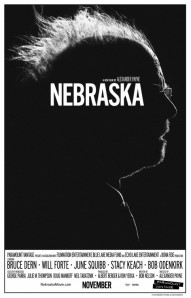I’ve been selling Nebraska to people as “a charming version of Fargo without the violence”. That gets attention fairly quickly.
Alexander Payne’s drama, however, is more quaint than quirky. Nebraska’s prominent road trip involving a distracted father Woody (played by Bruce Dern) and his patiently courteous son David (played by Will Forte) coasts along flat landscapes. The two converse about the past and the exciting current possibilities of million dollar winnings Woody received in the mail. The relationship between Dern and Forte is just one of the many likeable building blocks to this heavenly appealing film.
Practically everyone doubts Woody’s grand prize, saying that it’s a sham. Woody’s wife Kate (played by June Squibb) is also part of the crowd, often reminding her dullard husband of his unhelpful, checked-out personality.
David has a feeling that Woody’s prize is bologna too, but he can’t help but go along with his father’s happiness. David doesn’t hope to see his Dad fail. He’s going along for the ride because he shares the same sort of dream chasing. He even tells his mother he just wants to give his old man hope.
Payne shows his audience how far different types of hereditary characteristics can travel. We meet the men of the Grant family throughout the movie. The clan can be often seen together moderately stimulated by television while hesitantly trying to make small talk. During these moments, we observe that David – while taking on his father’s traits – can see the pattern.
Nebraska is wise, but also very funny. Screenwriter Bob Nelson understands the nature of telling dry readings, and Payne knows perfectly well how to direct his actors in accordance to the script.
Once Dern and Forte are set in scenarios that cause them to put their mission on hold, the movie turns into a collection of vignetted character driven pieces. We visit a cemetery where Kate calls out the dead. She remembers the flaws over strengths, but never with cynicism. Another scene has David and brother Ross (played by Bob Odenkirk) retrieving “stolen” equipment and leaving their worried parents to cover for them. Actually, this sneaky sequence plays out as a cuter version of Sideways’ unforgettable wallet sting – also directed by Payne.
Nebraska doesn’t feel like a movie that pretentiously puts its story aside, but rather understands that development – not comedy – is the main priority. We see Forte and Dern go through extensive characterizations. Like Forte’s David, Nelson and Payne are patient with how the pieces play out, making each step convincing. This is what separates the drama from other family adventures that follow a routine of “drive, stop, make the audience laugh, drive again”.
The cinematography is also a stand out. It’s beautifully shot in black-and-white giving the composed film an antiqued look. The shooting style adds to the film’s plainness without making the movie appear drab itself.
You often hear people describing a filmmaker’s movie as “a film with a warm heart and a kind soul”, and it couldn’t be more true with Nebraska. Alexander Payne’s film had me smiling throughout and I was quite swept up by how honest the film was being with its bare portrayal of a family tree rooted in the outskirts of Americana. It’s touching and delightful. I dare you not to be grinning by the final frames.




Good review Wylie. It’s the kind of small, subdued and pleasant movie I expect to see from Payne, even if it isn’t his best.